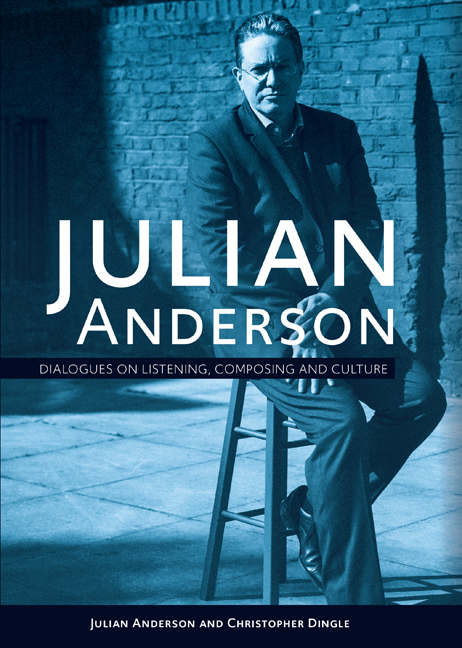Book contents
- Frontmatter
- Contents
- List of Illustrations
- Foreword
- Acknowledgements
- Introduction
- Prelude – Jeux: A Conversation Over Lunch
- Conversation One Origins
- Conversation Two Enthusiasms
- Conversation Three Training
- Conversation Four Dance
- Conversation Five Folk
- Conversation Six Composing (or Not)
- Conversation Seven Understandings
- Conversation Eight Beginnings (and Endings)
- Conversation Nine Puzzles
- Conversation Ten Singing
- Conversation Eleven Olly
- Conversation Twelve Memory
- Conversation Thirteen Opera
- Conversation Fourteen Practices
- Conversation Fifteen Outsiders?
- Conversation Sixteen Quartets
- Conversation Seventeen Advocacy
- Conversation Eighteen Partnerships
- Coda: Multiple Choices
- Chronology
- List of Personae
- Glossary of Musical Terms
- Macrotonality
- Catalogue of Published Works by Julian Anderson
- List of Recordings of Julian Anderson’s Music
- Bibliography
- Discography
- Index
Conversation Fourteen - Practices
Published online by Cambridge University Press: 16 September 2020
- Frontmatter
- Contents
- List of Illustrations
- Foreword
- Acknowledgements
- Introduction
- Prelude – Jeux: A Conversation Over Lunch
- Conversation One Origins
- Conversation Two Enthusiasms
- Conversation Three Training
- Conversation Four Dance
- Conversation Five Folk
- Conversation Six Composing (or Not)
- Conversation Seven Understandings
- Conversation Eight Beginnings (and Endings)
- Conversation Nine Puzzles
- Conversation Ten Singing
- Conversation Eleven Olly
- Conversation Twelve Memory
- Conversation Thirteen Opera
- Conversation Fourteen Practices
- Conversation Fifteen Outsiders?
- Conversation Sixteen Quartets
- Conversation Seventeen Advocacy
- Conversation Eighteen Partnerships
- Coda: Multiple Choices
- Chronology
- List of Personae
- Glossary of Musical Terms
- Macrotonality
- Catalogue of Published Works by Julian Anderson
- List of Recordings of Julian Anderson’s Music
- Bibliography
- Discography
- Index
Summary
The composer's relationship with time is the catalyst here for a wide-ranging conversation. The initial pages explore the distance between the length of time required to write and the duration of the resulting music. The significance of first rehearsals, the value of seeing other composers’ sketches and preliminary versions of works, and the importance of thinking about sketching strategies are all considered (along with the choice of pencil). Anderson's uneasy relationship with the metronome is explored, prompting discussion about composers’ tendency to change their minds and not having exclusive insight into their music. An exchange on historically informed performance ensues that, after debate about general trends, looks specifically at changing fashion in the performance of Mahler and the tempi in some of Messiaen's slow movements. Metronome issues then return centre-stage, notably in Anderson's Khorovod and the music of Carter, before the myth of the all-knowing composer is debunked. The conversation concludes with further examination of tempo in Messiaen and Boulez.
CD: Composers manipulate time – that's a given part of what they do – but the relationship with time in the process of composing is problematic. The music that goes fastest will have many more notes and will presumably take longer to write out. The music that is the slowest has fewest notes. There's an inverse relationship with the time of the musical material. How aware are you of these things?
JA: It came up the very first day I remember composing on paper. I had started composing in my head, not on paper, just making the sounds up – it was all orchestral music. After about a year or so I decided it was time to try and write some of this out. That's when I realised what the problem with composing was, because up till then it had seemed so easy. You just walk around in circles, avoiding the football on the field – I started composing in my head to relieve boredom while playing football at preparatory school – and you make up your piece, whatever it is, in real time, as if you were hearing it on the radio.
- Type
- Chapter
- Information
- Julian AndersonDialogues on Listening, Composing and Culture, pp. 275 - 298Publisher: Boydell & BrewerPrint publication year: 2020

